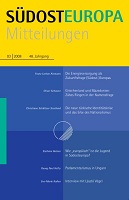Die Energieversorgung als Zukunftsfrage (Südost-)Europas
Energy Supply Determining the Future of (Southeast) Europe
Author(s): Franz-Lothar AltmannSubject(s): Politics / Political Sciences
Published by: Südosteuropa Gesellschaft e.V.
Summary/Abstract: Since 2002, the EU is trying to find access to the energy resources in the Caspian region, in Central Asia and in the Middle East in order to diversify its supply with primary energy. Southeast Europe was hereby identified as an important transit region and transit hub. It turned out that far-reaching unity of interests with regard to securing future energy supplies exists between the EU and the Southeast European countries. As for the latter the prospect of EU’s financial engagement plays an important role. The “Treaty Establishing the Energy Community” (signed in Athens on 25 October 2005) has two goals: to establish a common integrated electricity, and to prepare Southeast Europe for its projected role as a transit region for the diversified energy supply for Central and Western Europe, but also for Southeast Europe itself, by building up a transportation and distribution network for natural gas from the Caspian region and Central Asia. Russia is not at all excited to notice that a realisation of the projects will jeopardise its own attempts to gain a quasi-monopoly position as regards the energy supply of the EU and also of Southeast Europe. Gazprom has evidenced distinct attempts not only to strengthen its position in the EU’s gas imports but also to get hold of the domestic distribution networks in Southeast Europe, i.e. in Serbia, Bulgaria and Greece in particular, but at the same time also in England, Germany, and Italy.
Journal: Südosteuropa Mitteilungen
- Issue Year: 2008
- Issue No: 03
- Page Range: 4-15
- Page Count: 12
- Language: German
- Content File-PDF

